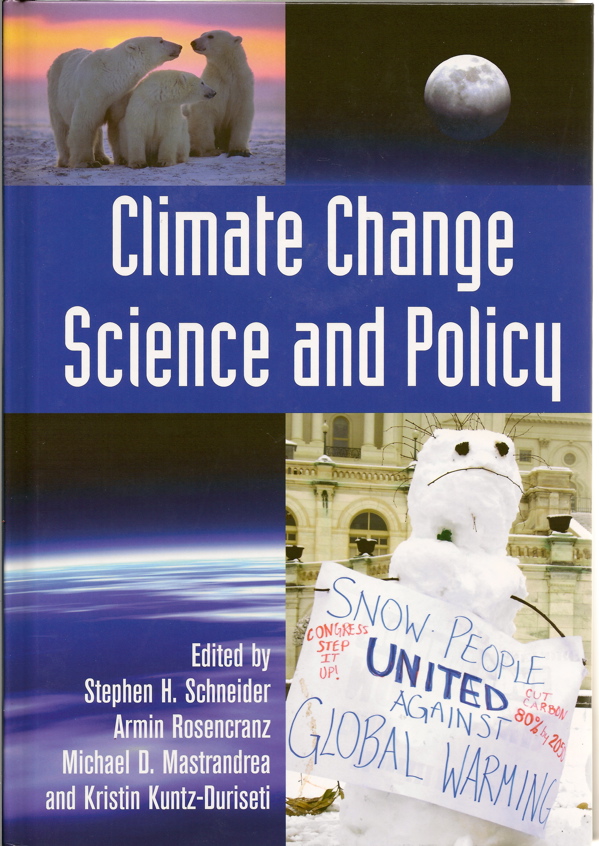 Authors: Stephen H. Schneider, Armin Rosencranz, Michael D. Mastrandrea and Kristin Kuntz-Duriseti Authors: Stephen H. Schneider, Armin Rosencranz, Michael D. Mastrandrea and Kristin Kuntz-Duriseti
In his prologue, John P. Holdren writes that the widely-used term “global warming” is a misnomer. He suggests that a more accurate label would be “global climatic disruption.” This volume, he states, will equip readers with all they need to know to rebut the misrepresentations being propagated by “climate-change skeptics.” No one, he writes, will be a skeptic after reading this book.
About the Authors
Stephen H. Schneider was the Melvin and Joan Lane Professor for Interdisciplinary Environmental Studies, Professor of biology, and a Senior Fellow, Woods Institute for the Environment, Stanford University.
Armin Rosencranz is the Founder and former President of Pacific Environment.
Michael D. Mastrandrea is a Consulting Assistant Professor at the Woods Institute for the Environment, Stanford University.
Kristin Kuntz-Duriseti is Managing Editor for the interdisciplinary journal, Climatic Change.
Go to top
Accolades
Superbly Organized and Presented: Midwest Book Review (Oregon, WI USA):
Climate issues are where science and politics often clash because of the conflict between objective science and subjective corporate interests, between concerns for the long term conditions of the earth and the short term advantages of electoral profits and corporate vested interests with respect to the specific phenomena of global climate change. That's why it is so important for not only the scientific community but the non-specialist general reader that titles like ‘Climate Change Science and Policy’, the collaborative work of Stephen H. Schneider (Melvin and Joan Lane Professor for Interdisciplinary Environmental Studies, Professor of Biology, and a Senior Fellow, Woods Institute for the Environment, at Stanford University); Armin Rosencranz (Founder and former President of Pacific Environment); Michael D. Mastrandrea (Consulting Assistant Professor, Woods Institute for the Environment, Stanford University); and Kristin Kuntz-Duriseti (Managing Editor, Climatic Change) addresses not only the science behind what is more accurately described in its pages as the global climate change which is now in progress, but the national and international governmental policy implications as well. Of special note is the introduction to this informed and informative 544-page compendium by John P. Holdren (Director of the White House Office of Science and Technology Policy). Superbly organized and presented, "Climate Change Science and Policy" is a seminal body of work and a strongly endorsed addition for academic, governmental, and community library Environmental Studies reference collections, and supplemental reading lists for non-specialist general readers concerned about environmental issues in general, and climate change in particular.
Climate scientist Stephen H. Schneider (who died in July, 2010) and his co-editors have organized 49 essays from noted experts to explore the state-of-our-knowledge of "global climatic disruption" and potential related policy initiatives. The essays are scholarly and, in some cases, quite technical, with charts, maps, and detailed sourcing.
There are five main sections. "Impacts of Climate Change" ranges over extinction, ecosystems, water, hurricanes, wildfires, forests of Amazonia, crop production and food security, human health, and unique and valued places. "Policy Analysis" looks at economic impacts, assessment modeling, risk perceptions, political feasibility, carbon taxes/trading/offsets, and the economic cost of reducing COs emissions. "International Considerations" include treaties, EU climate policy, population, inequities and imbalances, ethics and rights, developing countries, the Clean Development Mechanism, and climate change and policy in China, India and Australia. There is a large section (9 essays) on the United States, including an interesting look at California's approach to combating climate change and at the role of media and public education in shaping policy. The fifth section, "Mitigation Options to Reduce Carbon Emissions", discusses renewable energy, hydrogen and nuclear energy, coal capture and storage, "avoided deforestation" policy for tropical forests, and the pros and cons of engineering the climate.
Go to top
Press & Reviews
Choice Reviews: Highly Recommended
“Climate Change Science and Policy is the first book to successfully combine a discussion of the current state of climate science with ideas for climate change mitigation in a comprehensive, yet surprisingly readable, collection of papers by authors working in both the physical and social sciences. The first part of the book addresses climate change science and impacts, focusing primarily on impacts that are already occurring and attributable (at least partly) to anthropogenic activities. It is followed by a comprehensive overview of policy issues, including both economic considerations and perspectives from developed and developing countries. The final part of the collection focuses on climate change mitigation strategies such as conservation, renewable energy resources, and carbon capture but does not overlook nuclear energy and new technologies as part of a mitigation portfolio. National and international efforts to reduce harmful climate change impacts lie at the intersection of climate science and policy. This book presents the information needed to understand the myriad issues that define this effort and could serve as a textbook for a course on climate policy or as a reference source for any subfield of climate science and policy.”
Go to top
|
